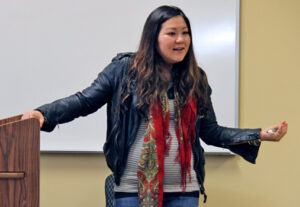
Part 4 - Teaching on the Pivot: Art Mends
(Part Four of a Five Part Serialized Blog)
There’s a difference between mending and healing. When we talk of healing, we are talking about going back to the “before” times, back to the time before harm occurred. However, we can’t always return to those places, can we? When we talk about mending, we are describing something being patched up but still bearing the scars of the injury or wound. During the process of learning how to teach and participate in this course, I witnessed the power of art to mend.
At the end of each two-week period, our classroom of artists would upload images of their pieces to our course page. We would meet together for two to three hours to share our work, to discuss together the challenges of making each piece, and to mark the spiritual shifts taking place through the practice of making art in the midst of everything happening in the world and in our personal lives.
Darci and I facilitated the conversation and took the posture of co-learners with the artists in the space. We realized quickly that the process of making and sharing art was a spiritual practice for our class in this pandemic learning time, because of the way it reconnected the threads to one another that were severed through online learning and lockdowns. It also connected us by holding space for the ongoing rage and grief we felt. During the semester, Black people were continually murdered by police and vigilantes, and as we witnessed together the aftermath of the Atlanta spa shootings of Asian women. Art and the process of creating art did not allow us to cover up our feelings. Art exposed the anger and grief we felt, utterly and viscerally. Art did not make room for short cuts and avoidance of those experiences and reactions that felt raw and painful. Every two weeks, we gathered to witness, learn, and confront what art had brought out in us and through us. We participated in visible mending. Art stitched us together in our grief, joy, and gratitude in a time that felt like crisis and chaos.
As part of each bi-weekly project, I posted a podcast discussing the material for the week together with current events and personal stories. The week of the Atlanta spa shootings hit me especially hard. I saw my mother and grandmothers in the faces and names of the women who were gunned down. Everything I knew and taught about U.S. imperialism, militarism, and the historic and policy-based sexualization of Asian women across the trans-pacific and here in the U.S. felt incredibly close. I kept thinking of every instance, and there have been many, where I or someone I knew was on the receiving end of anti-Asian racism and violence. I thought about the systematized invisibility of anti-Asian racism and violence and the gaslighting of Asian people at the denial of our histories and experiences. All of which were glaringly evident in the way police and the media reported on the Atlanta spa shootings. The rage bubbled over then, intermingled with the physical pain of grief, a burning spot in my chest that had been there my whole life, but felt suddenly unbearable. I wanted to cancel the podcast and cancel our class meet up for that week. I didn’t have the energy or the filter to proceed as normal.
In a fog of grief, I swiftly wrote out the class cancelation email and the apology for the missing podcast, but I never sent it. After I wrote out the memo, I remembered what this class had shown and taught me through our weeks together. Art doesn’t cover up. Art radically reveals. Art calls us to bear witness to the truth-telling limited by words alone. I showed up that week when it would have been perfectly acceptable to disengage. I reframed the podcast around the texts of the lives of Asian women throughout U.S. history and trans-pacific history. What did it mean to un-colonize the image and embodiment of Asian women through the eyes of the divine presence? To unmake the lies about Asian women as only flesh for white supremacist consumption through the practices and processes of art? What would that mean to and for me as an Asian and Korean American woman? At the end of our class meeting, we closed with a practice I call the Gaze of Gratitude. A practice I’ve developed as an online teaching ritual, for times when words fail. We used Zoom in gallery mode to scroll through each square, to behold each artist’s face and without words, to gaze upon each person with gratitude and to allow that gratitude to peer and shine out of our eyes and expressions. I wept. I couldn’t help it. I was once again in awe of the space that making and talking about art could facilitate; a space to reveal and contribute to necessary mending in community.
Leave a Reply